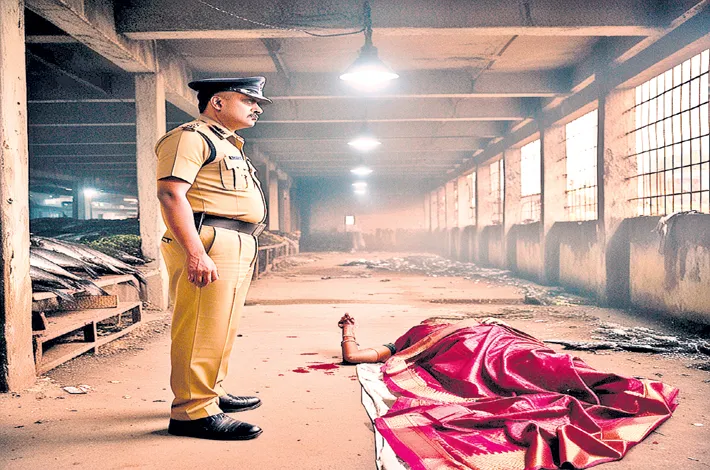The Shadow of Marina
23-07-2025 12:00:00 AM

The monsoon rains lashed Chennai, turning the streets into rivers of mud and mystery. Detective Vikram Rao, a grizzled veteran of the Chennai Police, stood beneath the awning of a roadside tea stall on Marina Beach, the salty tang of the Bay of Bengal mixing with the aroma of cardamom chai. His phone buzzed, cutting through the rhythm of the rain. A body had been found in an abandoned warehouse near the harbor, and the case had his name on it.
Vikram arrived at the scene, a crumbling structure reeking of fish and neglect. The warehouse was a relic of Chennai’s old port days, now a haunt for smugglers and strays. Inside, under flickering sodium lights, lay the body of a young woman, her silk saree stained crimson. Her throat had been slit with surgical precision, and a single jasmine flower rested in her folded hands—a chilling signature. The constable nearby whispered, “Looks like the work of the Jasmine Killer.”
The Jasmine Killer had haunted Chennai for months, a phantom who targeted women in their twenties, always leaving a jasmine flower as a taunt. Three victims so far, and the city was on edge. Vikram crouched beside the body, his eyes scanning for clues. Her earrings were missing, but a faint mark on her wrist caught his attention—a tattoo of a lotus, barely visible under the blood. It wasn’t mentioned in the previous case files. A new lead, perhaps.
Back at the station, Vikram pored over the files. The victims had little in common: a college student, a tech worker, and now this woman, identified as Meera Nair, a dancer at a local cultural center. No witnesses, no CCTV footage, no fingerprints. The killer was meticulous, a shadow slipping through Chennai’s chaotic sprawl. But the lotus tattoo nagged at Vikram. He cross-referenced it with local tattoo parlors and found a match at Ink Lotus, a small shop in Mylapore.
The parlor’s owner, a wiry man named Suresh, recognized Meera’s photo. “She came in two months ago,” he said, wiping sweat from his brow. “Wanted a lotus, said it was for someone special. She was with a guy—tall, wearing a hooded jacket. Didn’t catch his face.” Vikram’s pulse quickened. A companion. The first real thread in a case that felt like chasing smoke.
Vikram’s next stop was the cultural center where Meera performed. The director, a stern woman named Lakshmi, described Meera as talented but secretive. “She kept to herself, always left rehearsals early. Said she had evening appointments near the harbor.” The harbor again. Vikram’s instincts screamed that the killer was circling this area, hiding in its labyrinth of docks and warehouses.
That night, Vikram staked out the harbor, his old Ambassador car parked in the shadows. The rain had eased to a drizzle, and the air was thick with the hum of distant ships. Hours passed, and just as his eyes grew heavy, a figure emerged from an alley—a man in a hooded jacket, moving with purpose. Vikram followed on foot, his heart pounding. The man entered a derelict building, and Vikram crept closer, peering through a broken window.
Inside, the man stood over a table, arranging tools: a scalpel, a coil of rope, and a single jasmine flower. Vikram’s blood ran cold. He reached for his radio, but a creak of the floorboard betrayed him. The man spun around, his face obscured by the hood, and bolted through a back exit. Vikram gave chase, weaving through the maze of crates and fishing nets. The man was fast, but Vikram’s years on Chennai’s streets gave him an edge. He tackled the suspect near the water’s edge, pinning him to the ground.
The hood fell back, revealing a young man, no older than thirty, with wild eyes and a scar across his cheek. “You don’t understand!” he screamed. “I’m saving them!” Vikram cuffed him and searched his pockets, finding a photo of Meera and a list of names—two of which matched the previous victims. The man’s name was Arjun, a former medical student expelled for unethical experiments. His ramblings about “purifying souls” chilled Vikram, but the lotus tattoo nagged at him. Arjun didn’t seem connected to it.
At the station, Arjun confessed to the murders, claiming the jasmine flowers were offerings to a goddess he believed guided him. But when pressed about the lotus tattoo, he grew confused, insisting he didn’t know about it. Vikram’s gut told him something was off. The precision of the kills, the lack of evidence—it felt too clean for a delusional killer like Arjun. Was he a copycat? Or a pawn?
Vikram returned to the cultural center, digging into Meera’s life. Her phone records showed frequent calls to an unregistered number, traced to a burner phone near the harbor. He also found a hidden diary in her apartment, detailing her fear of being followed by someone she called “the Watcher.” The last entry mentioned a meeting at the warehouse the night she died.
With a hunch, Vikram revisited the harbor, this time with backup. In the same warehouse, he found a hidden room behind a false wall. Inside was a shrine of sorts—photos of the victims, jasmine flowers, and a ledger listing payments to Arjun. The Watcher wasn’t Arjun; he was a hired hand. The real killer was someone else, someone with access and influence.
The ledger pointed to a name: Lakshmi, the cultural center’s director. Vikram confronted her at her office, where she sat calmly, her hands folded. “You’re clever, Detective,” she said, her voice cold. “Meera was getting too close to exposing my side business—trafficking girls through the harbor. The others were loose ends. Arjun was just a tool, easy to manipulate.” She smirked, but her confidence faltered as Vikram’s backup stormed in.
Lakshmi’s arrest sent shockwaves through Chennai. The Jasmine Killer case was closed, but Vikram felt no triumph. The city’s underbelly had revealed its rot, and he knew more shadows lurked in its depths. As he stood on Marina Beach, the waves crashing under a clearing sky, he lit a cigarette and exhaled. The jasmine scent lingered in the air, a reminder that in Chennai, even the rain couldn’t wash away all sins.








